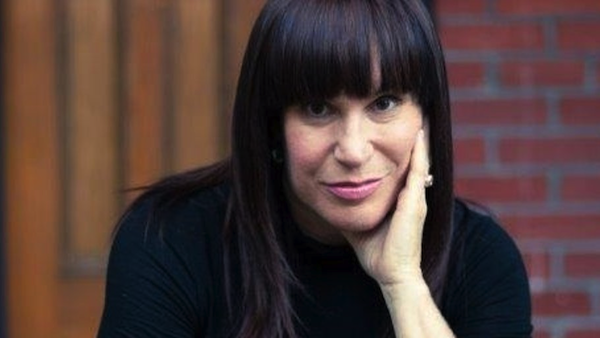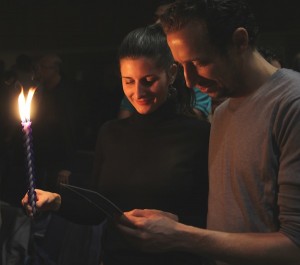Adrienne Gold is a participant in this year’s international Shabbat Project, Nov. 15-16. (photo from Shabbat Project)
FOMO: fear of missing out. Four letters that encapsulate the human hankering for absolute control, and the profound anxiety we suffer from knowing we will simply never satisfy it.
FOMO is an impulse exacerbated by social media, by scrolling through the Facebook, Instagram and Snapchat lives of others, consciously and unconsciously measuring ourselves up to their non-existent standard of living. Comparing our brats to their seraphs, our tiresome drudgery to their idyllic island getaways, our 1980s-style kitchens to their gleaming open-plan masterpieces. And, while social media does not itself cause narcissism, it certainly can help flick the switch of those tendencies latent within us. Especially those of us who suffer from FOMO by nature.
When I was a young girl, I constantly worried that I had missed something, anything that would change the tone and balance of my carefully curated life. In our family, kids came in for the night “when the lights went on” in the street. Many of my neighbourhood friends could stay out later than that, and I remember like it was yesterday sitting in my room fretting over the potential new allegiances that would be formed without me; the stories and games and fun that I would not be privy to. I would be gripped by a terror that things would not be “as I left them” and that the next day would begin leaving me in the dark.
This mindset remained with me through my teens. Wherever I was, I wondered what was happening somewhere else. Whoever I was speaking with, at whatever party, my eyes roved the room to see what else was happening, who else was there? It was as though I had internalized that whatever I was engaged in could not possibly be where the “action” was; that I was missing something that could only happen if I were not there. And this unease continued into my dating life and well into my 20s. There was no me without my agitating the universe, without my scrambling and “hustling for worthiness.”
So, imagine my horror when, many years later, I learned about Shabbat. No phone. No computer. No car. No shopping. No way! What possible benefit could there be in living 24/6 in a 24/7 world? And what if someone needed to reach me? What would I fill those gaping 24 hours with? I was a human doing, with no clue how to be. Or who to be.
Yet, in that struggle with the very idea of Shabbat came the deep epiphany that radically changed not just my world, but my psyche. In advance of this year’s international Shabbat Project, which will be taking place in cities around the world Nov. 15-16, I’m inspired to share this journey.
I was 40 when I started to keep Shabbat. (How that came about is too lengthy and labyrinthine a tale for this space.) Married with two children, deep into my career and as afflicted by FOMO as ever. Nevertheless, I was determined to do this. While the anxiety clung in the early stages of my “disconnecting in order to connect,” it was less than a year before I began to understand something that had eluded me my entire life – apparently, the world turned and ran quite nicely without my help. The control I was seeking could be found by relinquishing it. The Mishnah tells it straight when it says, “Who is rich? He who rejoices in his lot.” I learned to be still, to rejoice in my lot, to be in the moment. I felt rich.
In short, Shabbat forced me to stop trying to play God, to stop long enough to recognize that He did just fine without me. I discovered that “letting go and letting God” gave me the freedom to find value and purpose, and even joy – not in productivity but in simply being. I felt in touch with my soul and grasped in a deep sense its primacy over the body.
Over 20 years have passed since the therapeutic benefits of Shabbat first liberated me from my FOMO and gifted me perspective and clarity on what it means to be a human being; since I first tasted the indescribable spiritual delights of the Jewish day of rest.
Today, I have the pleasure and the privilege of introducing thousands of women every year to Shabbat and more. Momentum – formerly known as the Jewish Women’s Renaissance Project – has, to date, taken more than 18,000 women from 27 countries on an eight-day journey to Israel to grow as people, connect to Jewish values, engage with the Jewish homeland, foster unity not uniformity, and return to take action as leaders in their communities.
As a leader on these trips, I have seen thousands of women try to make Shabbat more meaningful in some way or another. These women saw the power of what disconnecting in order to connect might do for their families, and for themselves.
Shabbat is the only mitzvah described in the Torah as a “gift.” Tragically, it’s a gift that too many of us never take the time to unwrap. I was one of them. What I didn’t understand was that ceasing to create would make me more creative, that not exerting myself would give me more strength, that being where I am, limited, constrained, here and nowhere else, has alerted me to the joy in my heart and in my life.
You were wondering about that pesky FOMO? It has become JOMO: joy of missing out.
Adrienne Gold, a participant in this year’s international Shabbat Project, was a fixture on Canadian television for more than 15 years, hosting her own daily fashion and beauty program. Today, she is a trip leader for Momentum (formerly, the Jewish Women’s Renaissance Project).









